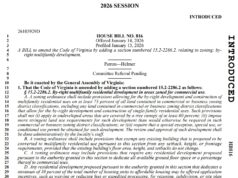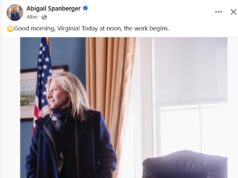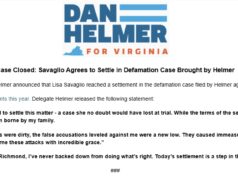(UPDATE: Sen. McEachin has issued a statement in which he “commend[s] the governor for his promise about next year’s Civil War month.” – promoted by lowkell)
 I’m very glad to see Bob McDonnell finally get it right on the Civil War, even if he exhausted all other options before he managed to do so. The full speech – delivered earlier today at Norfolk State University, for a conference entitled, “Race, Slavery, and the Civil War: The Tough Stuff of American History and Memory” – is after the “fold,” but the highlights are:
I’m very glad to see Bob McDonnell finally get it right on the Civil War, even if he exhausted all other options before he managed to do so. The full speech – delivered earlier today at Norfolk State University, for a conference entitled, “Race, Slavery, and the Civil War: The Tough Stuff of American History and Memory” – is after the “fold,” but the highlights are:
*Today’s Virginia is a “diverse” place, in which we are committed to “the founding ideal of equal liberty and justice and opportunity for all.”
*McDonnell’s Confederate History Month proclamation was flawed, due to its “major and unacceptable omission of slavery” an omission which “disappointed and hurt a lot of people, myself included.”
*”Slavery was an evil and inhumane practice which degraded people to property, defied the eternal truth that all people are created in the image and likeness of God, and left a stain on the soul of this state and nation.”
*In April 2011, McDonnell will issue a “Civil War in Virginia” proclamation that will remember all Virginians-free and enslaved; Union and Confederate. It will be written for all Virginians.”
Again, I’m glad to see that Bob McDonnell finally got this right. I just wish we could get to a place in Virginia where no governor would ever conceive of getting it wrong, whether an “error of haste” or “of heart.”
Welcoming Remarks of Governor Robert F. McDonnell
“Race, Slavery, and the Civil War:
The Tough Stuff of American History and Memory”
Virginia Sesquicentennial of the American Civil War Commission – 2010 Signature Conference
Norfolk State University
Norfolk
September 24, 2010
FOR PUBLIC RELEASEThank you Virginia (Board), for that kind introduction, and Dominion for sponsoring this great event.
Thank you President Kim Luckes, Rector Ed Hamm, and the Norfolk State University community for hosting all of us today.
I want to congratulate the Green and Gold, the Spartans, on a great start to the season. 51 points last week……you are doing a lot better than my alma mater, Notre Dame. We’ve suffered through some tough ones recently!
And I want to thank the General Assembly, Cheryl Jackson and the staff of the Sesquicentennial for planning for years to take on these pivotal issues.
On behalf of the Commonwealth of Virginia, I welcome scholars and leaders from around the nation to this very important conference to discuss the truly tough stuff of the American Civil War.
Virginia now begins the four year period marking the 150th Anniversary of the Civil War.
A prosperous, dynamic, and diverse Commonwealth is attempting to remember, understand, and put into proper perspective one of the most painful and bloody periods in the history of western civilization. This is not going to be easy.
I know that from firsthand experience.
In the century and a half since the armistice was executed at Appomattox, few states have undergone as many changes, or witnessed such stunning growth and progress, as our Commonwealth. Our borders have been fixed for 147 years; but our culture, community, and breadth of opportunity have been incredibly dynamic. These changes have made Virginia a stronger and better place.
But they have also made our collective “memory” — how our diverse society remembers and processes the events in its collective history — much more complicated.
In earlier times, Virginia’s dominant culture was defined by relatively few, and basic civil rights were excluded for many. Whatever the strengths and weaknesses of that culture, and both were present in abundance, as in any human enterprise – there was a common lens through which to view history. Those in power wrote a single, narrow narrative. It left out many people, along with their powerful stories.
And so, while talking about our history has become more complicated today, we can all agree it has also become a much richer conversation.
Today we are a Commonwealth of nearly 8 million people, and one in ten citizens are foreign born. We come from many different countries, backgrounds and traditions. Modern Virginia is a place of great natural beauty, hope, and opportunity, a place refined in the crucible of conflict, and renewed in its commitment to the founding ideal of equal liberty and justice and opportunity for all.
We have made progress together in Virginia. The nation’s first African-American governor. An African-American is Chief Justice of the Supreme Court. The nation’s first official expression of “profound regret” for slavery from a legislature. A marvelous civil rights memorial in front of the Governor’s Mansion, and a wonderful new portrait of Barbara Johns that I helped unveil last Friday in the State Capitol.
In my Inaugural Address, I tried to tell this story of progress, and reflect on Virginia’s common history.
I stood on the steps of the State Capitol, looking down towards the James River, the waterway of the settlers. The building behind me was designed by Virginia’s second Governor, Thomas Jefferson. Inside it, Robert E. Lee, the son of a Virginia governor, took command of Virginia’s military forces in 1861. Four years later, President Abraham Lincoln visited the Capitol as the fallen city around it burned. In 1990 that same building welcomed the inauguration of my friend, Governor Doug Wilder, the grandson of slaves. And now I stood there, a descendant of ancestors who were poor farmers in Ireland in the 1860’s. An average middle class kid from Fairfax County became part of that gubernatorial tradition tracing back to Patrick Henry.
I was far less successful in capturing the full meaning of our history when, four months later, I issued a proclamation concerning Confederate History Month. My major and unacceptable omission of slavery disappointed and hurt a lot of people, myself included. Young people make mistakes, and I suppose sometimes young administrations do as well. Ours was an error of haste and not of heart. And it is an error that will be fixed.
Next April our office will issue a “Civil War in Virginia” proclamation commemorating the beginning of the Civil War in our state.
This proclamation will encapsulate all of our history. It will remember all Virginians-free and enslaved; Union and Confederate. It will be written for all Virginians.
While we cannot fully put to paper the definitive collective memory of this period, we are going to at least ensure that all voices are heard in the attempt.
The legacies of the Civil War still have the potential to divide us. But there is a central lesson of that conflict that must bond us together today. Until the Civil War, the founding principle that all people are created equal and endowed by their Creator with unalienable rights was dishonored by slavery. Slavery was an evil and inhumane practice which degraded people to property, defied the eternal truth that all people are created in the image and likeness of God, and left a stain on the soul of this state and nation. For this to be truly one nation under God required the abolition of slavery from our soil. Until the Emancipation Proclamation was issued and the Civil War ended, our needed national reconciliation could not begin. It is still a work in progress.
150 years is long enough for Virginia to fight the Civil War.
Now, on the eve of this anniversary, is a time for us to approach this period with a renewed spirit of goodwill, reverently recalling its losses, eagerly embracing its lessons, and celebrating the measure of unity we have achieved as a diverse nation united by the powerful idea of human freedom.
A modern Virginia has emerged from her past strong, vibrant and diverse. Now, a modern Virginia will remember that past with candor, courage and conciliation.
It is my hope that the work of the Sesquicentennial Commission will bear much fruit, starting with this conference. Beginning in 2011, people will come from across the world to see the solemn battlefields of Virginia, home to more than any other state, and we encourage and welcome that tourism. Experts will come to conferences and appear on TV and debate the causes, tactics and legacy of the war that divided America, and we encourage that dialogue. Perhaps most importantly, we must do what we are doing today. We must talk openly and honestly about how we as Americans, black, white and brown can promote greater reconciliation and trust and greater access to the American Dream for all, so that there is more peace in our hearts and homes, schools and neighborhoods.
Again, I thank all of you for joining us here today to discuss the “tough stuff” of the Civil War. May a spirit of mutual respect and love govern your discussions.
Have a great conference and God Speed!
Thank you.
UPDATE: Donald McEachin has issued a statement.
I would like to take this opportunity to commend the governor for his promise about next year’s Civil War month. As someone who has not hesitated to comment when I believed the governor is in error, I want to also praise him when I believe he is right.
Here in Virginia, we can only truly commemorate and remember the Civil War by honoring the memory of all those who suffered during those horrific times. The Commonwealth that we all love ran red with blood and suffering in those times. Young men on both sides of that confrontation were killed, wounded and maimed here. Civilians, both black and white, free and slave, also suffered and died. The losses here were staggering, not only of family members never to be seen again, but of homes that families had spent years building and creating and, with the loss of those homes and their loved ones, dreams were lost. Those losses were suffered by people of all colors, slave and free.
Let me thank the governor again for acknowledging this universal suffering and for putting in place the process for us as Virginians to remember this time and to learn from it. As we study this conflagration, let us remember that freedom and liberty are a universal human rights and that we Virginians must rededicate ourselves to ensuring that all people are able to live free.










